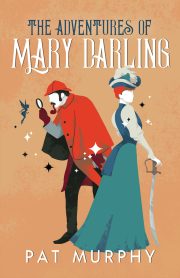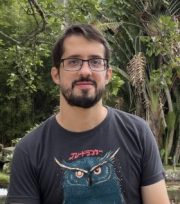Russell Bates: A Remembrance
by John Walters
I have been reading a dynamic new book called The Heartbeat of Wounded Knee: Native America From 1890 to the Present, and I thought about my Native American friend Russell Bates and wondered what he might think of the book. I hadn’t been in touch with him since I moved back to the States from Greece, so I ran a search to see if I might find a recent email address or Facebook page where I could re-contact him.
That’s when I came across his obituary. It said that he died on April 19, 2018, after a brief illness. He was seventy-six years old.
I met Russ at the 1973 Clarion West science fiction writing workshop. I had just turned twenty years old and he would have been in his early thirties. As he explained, he had got into a serious accident while serving a stint in the Air Force, and while he was in the hospital, he turned to writing. I was a total neophyte, but he had credentials. He had worked in Hollywood as a screenwriter, and Harlan Ellison had bought one of his stories for his legendary anthology The Last Dangerous Visions. Nobody knew that the book would never see print, and at the time everyone at Clarion wanted to be in it. (Ellison later bought a second story from Bates that should have also appeared in the anthology.)
If truth be told, as I’ve said elsewhere, I was too young, too immature, too inexperienced to benefit much from the Clarion experience. I did my best but didn’t make much progress with my writing. The main benefit for me was the opportunity to meet other writers and forge friendships. Russ, Paul Bond, a few others, and I would head out to the University District near the University of Washington campus where we were staying and drink beer together. Most of us, apart from Russ, were underage, but I led the way because I was familiar with the area and knew the bars that didn’t ask for ID.
After Clarion West, I languished in nowhere land for awhile, and then decided to hit the road and find my voice as a writer. On my first hitchhiking journey, to Mexico and Central America, I stopped in Los Angeles and slept on the floor of Russ’s apartment. That may have been the time that Russ took me on my first and only visit to Harlan Ellison’s house in Sherman Oaks. At the time, Russ and another 1973 Clarion West graduate, David Wise, had also recently collaborated on a script for the Star Trek animated TV series, “How Sharper Than a Serpent’s Tooth.” The episode went on to win an Emmy, and that’s probably the piece of writing for which Russ is best known.
After that first trip, I decided to head down to Los Angeles and attempt to become a screenwriter. Russ had moved back to Oklahoma by then, but he eventually returned, and he stayed at my apartment for awhile until he found his own place. While he was there, we collaborated on a treatment for a then-popular TV show, which Russ attempted to sell but was unsuccessful.
When Russ eventually decided to go back to Oklahoma, our fellow Clarion graduate Paul Bond and I decided to drive him. So in Paul’s car we crossed California, Arizona, New Mexico, and Texas, finally to arrive at Russ’s hometown of Anadarko, Oklahoma. There Paul and I met Russ’s parents, John and Agatha Bates, and his brother David. His mom cooked up some beans and fry bread that to this day is one of the finest meals I have ever eaten. Russ’s family was wonderfully hospitable.
One evening Russ, David, Paul, and I decided to go out to a rowdy bar that featured half-naked dancers on stage. We had a few, or possibly more than a few, pitchers of beer. Somehow when it was time to leave I ended up out in the parking lot before the rest of them, and I was surrounded by a crowd of red-neck Oklahoma young people who were obviously pissed off that I was consorting with Native Americans. Before I realized what was happening, one of them punched me in the face and opened a deep cut above my left eye; I retained the scar for decades afterwards. I was figuring the odds weren’t too good for me when all of a sudden Russ’s brother David charged out of the bar. He wasn’t too tall, but he was a big man. He looked very mean and angry. There were at least half a dozen of the red-neck yokels, but David must have had a reputation, or maybe it was his appearance of a bull about to charge… Whatever the reason, all those hicks scattered and ran. David saved my ass from a severe beating, and I was grateful.
After Paul and I left Oklahoma, I never saw Russ again, but the story isn’t over. While I was raising my family in Greece, I got back in touch with him via email. We started to correspond. He’d tell me about his latest writing projects, and I’d tell him about mine. He wrote me that as he recalled, he owed me some rent money from when he stayed at my place in Los Angeles. I told him that when we met again, he could buy me a steak and we’d call it even. I asked him for his recommendations of good Native American fiction and nonfiction, and he sent me a list; through it I found some great reading material. We lost touch again when I moved back to the United States and went through the long-term trauma of severe culture shock. I’ve always hoped that eventually I’ll be able to snap out of my financial struggles and get a little breathing room, and if I do, I’d like to travel again. I had an idea that on one of my hypothetical road trips I’d stop in at Russ’s house, the Bates Motel as he called it, and we’d share some beers and we could get that steak he’d promised me.
Too late now. It’s a sad thing that we’ll never be able to see each other again, and that the literary public will never be able to enjoy some of the projects he had been working on.
Rest in peace, my friend.


